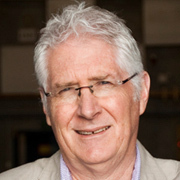
Chris Bailey
With more than four decades in the screen industry, Chris Bailey is one of New Zealand television's most prolific directors and producers. His directing credits cross many genres, including police and law shows (Mortimer's Patch, Street Legal) historical dramas (Greenstone), docudramas (Fallout) black comedies (Burying Brian) and a host of series aimed at children and young people.
Bailey first joined Television New Zealand in Christchurch, as a technical trainee. After moving to Auckland and doing a production course in 1977, he got his first taste of directing the following year, with short-lived soap Radio Waves, set in an Auckland radio station.
Bailey was soon carving out an impressive niche directing kidult series. In 1981 he commaned the first screen adaptation of Maurice Gee's Under the Mountain, an adventure involving aliens who are mysteriously connected to the city's volcanoes. Bailey found the show "incredible fun" to make, partly through the team thinking outside the square as they captured images of slimy aliens and teleportation. Three years later, alien encounter series Children of the Dog Star won Best Children's programme at the San Francisco International Film Festival, as well as a Feltex Award back home for Ken Catran's script.
Bailey also directed all six episodes of 1985 kidult adventure Terry and the Gunrunners, based on the local comic. Made with an eye for international sales, the series featured larger-than-life acting, animated sequences, and oversized props; the cast included Billy T James and ex-Goon Michael Bentine.
Bailey's other shows for younger audiences include directing for ambitious puppet show Space Knights, Betty's Bunch, the Jules Verne-inspired Mysterious Island, and skateboard adventure Hard Out. On 1990 adventure Strangers, Bailey produced, finding himself dealing with the complications of Cyclone Bola raging through Auckland, completely disrupting the shooting schedule.
His directorial CV also includes the first episode of stylised soap Gloss, working with "a great", fun, and committed cast, plus 90s Gen X series City Life, and "the massive challenge" of two-parter Fallout. Based on the events leading up to PM David Lange taking New Zealand anti-nuclear in the 1980s, Fallout saw Bailey commanding one of the largest casts of any local TV production, recreating real-life people and events still fresh in the memories of many viewers. In his book Drawn Out, the project's originator Tom Scott argues argues that the company producing the project "were never entirely convinced until they saw the first rushes and were blown away" with the work of Bailey and Australian actor Mark Mitchell (who played Lange).
Bailey was also getting involved in international co-productions, initially as a director on 1987 series Adventurer. Made by TVNZ and England's Thames Television, it followed on from earlier British period romp Smuggler. British lead Oliver Tobias (The Stud) was now joined by many Kiwi actors. Bailey oversaw further international co-productions (including France, Australia, Canada and the United States) during an extended stint as Head of Production at South Pacific Pictures, including the multi award-winning Monkey House.
In 1991 Bailey won a New Zealand Film and Television Award for his work on another co-production: period drama Gold, which followed two young Canadians seeking their fortunes in the goldmines of Central Otago. Later reformated into a series of television movies, the show saw Bailey working alongside screenwriter Greg McGee (Fallout) and veteran producer Chris Hampson.
In 1998 the Bailey/McGee/Hampson trio co-founded production company ScreenWorks from a cramped office on Auckland's Ponsonby Road, above a fish and chip shop. Eventually they won funding to make long-running drama series Street Legal, which revolves around a maverick lawyer (Jay Laga'aia), his legal partner (Kathleen Kinnard) and a police detective (Charles Mesure). Bailey directed 40 of the show's 54 episodes, often shooting guerilla-style on the streets of Auckland.
Street Legal was the first New Zealand drama series to be bought for syndication by Australian television; it also sold to France, South Africa and Russia. Bailey went on to help develop, then direct ScreenWorks productions Hard Out (a teen adventure), Orange Roughies (a border security drama) and arguably the company's most ambitious production, conspiracy thriller Doves of War.
Bailey was also one of the producers of big-budget Greg McGee-originated bodice-ripper Greenstone (1999), a co-production between BBC and TV One. Three weeks into the shoot the British director departed the show, and Bailey joined the directing team. Greenstone follows a missionary-educated Māori woman (Simone Kessell) whose romantic life is subject to the shifting loyalties of her chiefly father (George Henare).
Bailey was one of the original executive producers at the launch of South Pacific Pictures soap Shortland Street. From around 2008 he moved increasingly back into producing; including stints on SPP hits Go Girls and Nothing Trivial and The Brokenwood Mysteries. He went on to spend time as Managing Director, overseeing the company's productions and operations alongside CEO Kelly Martin.
Profile updated on 17 November 2022
Sources include
'Chris Bailey - producing TV classics' (Video Interview), NZ On Screen Website. Director Andrew Whiteside (Uploaded 5 April 2011). Accessed 3 November 2011
South Pacific Pictures website. Accessed 29 March 2018
'The ScreenWorks Team: Chris Bailey' (Profile). ScreenWorks website. Accessed 29 March 2018
Trisha Dunleavy, Ourselves in Primetime - A History of New Zealand Television Drama (Auckland University Press, 2005)
Tom Scott, Drawn Out (Auckland: Allen & Unwin, 2017)
Strangers Press kit